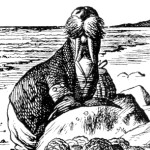 Douglas Adams is an acquired taste.
Douglas Adams is an acquired taste.
I say that with some sadness, but also with a great deal of personal certainty. Because despite my sincere and repeated efforts, I’ve never been able to acquire it.
I know many, many tasteful folks who love him and his famous “Hitchiker’s Guide”, so I know it can be done. And I include my wife in this exclusive group, which is partially why I admit my lack of appreciation with some sadness. But as long as I can remember, I’ve been on the Outside-Looking-In when it comes to Adams.
I’ve just never been able to get around the unpredictability and uncentered-ness of it all. I need a frame of reference — a fixed point — in order to appreciate a work, and he gives me none. (My wife can tell you that this trait-flaw applies to many, many things in my life. It’s why I exited “Lost” long before it actually ended. And why I hate most French Impressionistic music. “Most,” I said; not “All.” Put those pitchforks down.)
So, Adams writes things like this:
…it has great practical value – you can wrap it around you for warmth as you bound across the cold moons of Jaglan Beta; you can lie on it on the brilliant marble-sanded beaches of Santraginus V, inhaling the heady sea vapours; you can sleep under it beneath the stars which shine so redly on the desert world of Kakrafoon; use it to sail a mini raft down the slow heavy river Moth; wet it for use in hand-to-hand-combat; wrap it round your head to ward off noxious fumes or to avoid the gaze of the Ravenous Bugblatter Beast of Traal (a mindboggingly stupid animal, it assumes that if you can’t see it, it can’t see you – daft as a bush, but very, very ravenous); you can wave your towel in emergencies as a distress signal, and of course dry yourself off with it if it still seems to be clean enough.
And this:
Eskimos had over two hundred different words for snow, without which their conversation would probably have got very monotonous. So they would distinguish between thin snow and thick snow, light snow and heavy snow, sludgy snow, brittle snow, snow that came in flurries, snow that came in drifts, snow that came in on the bottom of your neighbor’s boots all over your nice clean igloo floor, the snows of winter, the snows of spring, the snows you remember from your childhood that were so much better than any of your modern snow, fine snow, feathery snow, hill snow, valley snow, snow that falls in the morning, snow that falls at night, snow that falls all of a sudden just when you were going out fishing, and snow that despite all your efforts to train them, the huskies have pissed on.
And this:
“You may not instantly see why I bring the subject up, but that is because my mind works so phenomenally fast, and I am at a rough estimate thirty billion times more intelligent than you. Let me give you an example. Think of a number, any number.”
“Er, five,” said the mattress.
“Wrong,” said Marvin. “You see?”
I’m sure there’s something hilarious in those quotes. Absolutely convinced of it. It’s right on the tip of my brain’s tongue; I can almost taste it. …But I just can’t. Not really. There’s just too much oddness for me to wade through. And nothing for me to hold on to while I’m wading. (I’ve been told that listening to it read aloud helps. I’ve tried. It helped not.)
Of course, he also writes things like this (which I love):
He gazed keenly into the distance and looked as if he would quite like the wind to blow his hair back dramatically at that point, but the wind was busy fooling around with some leaves a little way off.
So, I’m not a complete Philistine. Just a partial one. Still, sadly, he’s hit-or-miss with me. Or at least he was. Until today. Because now I’ve found something with which I am totally on-board. No qualifications necessary. No need to search for a center, or to figure out how I’m missing his point, or to simply stand by while others appreciate what I’m sure is there (but which I just cannot see myself).
This:
The familiarity of the Brandenburgs should not blind us to their magnitude. I’m convinced that Bach is the greatest genius who ever walked among us, and the Brandenburgs are what he wrote when he was happy.
The above quote is from his posthumous “The Salmon of Doubt,” and the clip below is what he’s talking about. Give it a listen, and let a) the technical genius and b) the undeniable happiness wash over you:
Point made, Douglas. Point made with a clarity and accuracy with which even I, a life-long Adams-dissenter, can happily agree.
The entire thing is fantastic, actually. It’s called “Brandenburg 5,” and you can read it below (if I’ve figured out how the little Google embed works.) And it’s absolutely convinced me to keep trying. Because the man who says that about Bach is worth figuring out, no matter how much work it is.
HT to The Thirsty Gargoyle. Also, just in case I buried it too deeply in the sea of links, HERE is a YouTube video of Douglas Adams reading his most famous work. And even I can see that that’s pretty cool!


















